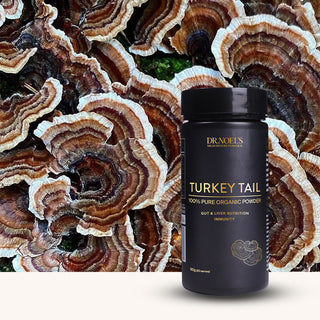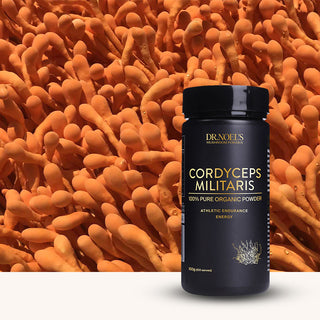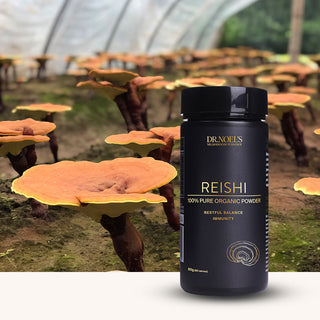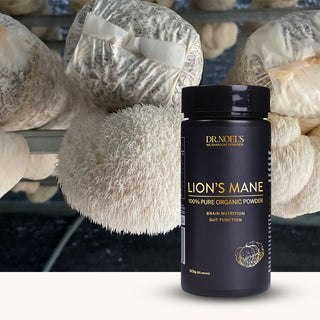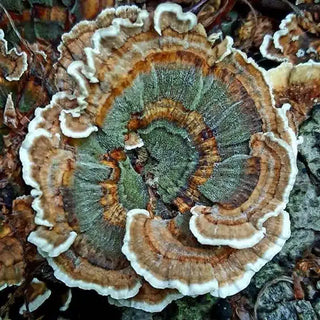At 7% of all cancer-related deaths in both men and women, pancreatic cancer ranks as the fourth most common cause of cancer-related mortality. Pancreatic cancer has a lifetime risk of roughly 1 in 64. However, a person’s risk of developing this cancer may vary depending on certain risk factors.
For most cases of pancreatic cancer, the prognosis is not good. Eighty percent of patients have metastatic or locally advanced disease at the time of diagnosis. It is quite aggressive and often responds poorly to therapy. New treatments are, therefore, desperately needed.
Chemotherapy medications, radiation therapy, or a mix of the two are typically the standard pharmacologic treatments for existing pancreatic cancer. Unfortunately, their success rate is low. Certain supplements and nutrients have been shown in studies to help reduce the risk of pancreatic cancer and slow its spread.
Turkey tail mushrooms help boost immunity and combat cancer. Traditional healers have used Turkey tail mushrooms to boost immunity for thousands of years.
An increasing amount of scientific evidence suggests that the ancient healers were right.
Researchers discovered that polysaccharide krestin (PSK) and polysaccharide peptide (PSP) are the primary carbohydrates supporting your immune system. They function as immunological modulators as well as activators.
Read on to learn how Turkey tail mushrooms strengthen the immune system and help fight pancreatic cancer.

Exploring Turkey Tail Benefits For Pancreatic Cancer
There is growing evidence that Turkey tail mushrooms target cancer cells, including those found in the pancreas, from three separate angles. First off, the antioxidant properties of the mushroom protect healthy cells from free radicals, which can damage healthy cells and accelerate the growth or development of malignancies.
Second, researchers have shown that PSK has anti-tumor properties. Third, the mushrooms support a robust defense mechanism. Researchers have shown that Turkey tail mushroom and its active ingredients boost white blood cell production. Macrophages, in particular, are white blood cells that fight infections and remove debris from the body, possibly leading to the development of cancerous cells.
The following is currently known about the benefits of Turkey tail mushrooms for pancreatic cancer.
Turkey tail may cause death of cancer cells
An experimental study discovered that PSK, isolated from Turkey tail mushrooms, may have anti-cancer properties and the potential to synergize with a specific chemotherapeutic drug to combat pancreatic cancer. The Chemotherapy drug docetaxel has been found to promote programmed cell death (apoptosis) in a range of cancer cells. According to the findings of this study, SK-enhanced apoptosis is triggered by docetaxel in human pancreatic cancer cells,
As a result, combining PSK with a low dose of docetaxel may be a novel therapeutic strategy for treating pancreatic cancer patients.
Benefits Of Turkey Tail
The effects of Turkey tail mushrooms on infections, cancer, and the immune system are being investigated more and more. Here are some of the most well-known benefits of Turkey tail mushrooms:
- Turkey tail’s antioxidant properties help shield DNA from damage caused by free radicals.
- Turkey tail contains bioactive compounds that stimulate the innate and adaptive immune systems, hence stimulating the immune system.
- As adaptogens, Turkey tail mushrooms assist the body in adjusting to physical, chemical, and biological stressors.
- Turkey tail promotes a normal inflammatory response and fights oxidative damage.
- Turkey tail PSP might have hepatoprotective properties.
- Normal insulin sensitivity helps keep blood sugar levels within a healthy range, and PSP may support this.
- Turkey tail beta-glucans can potentially be a source of prebiotics that improve intestinal health.
- The mushroom might improve sports performance.
When looking for the right Turkey tail mushroom supplement, there are a few more technical aspects of medicinal mushrooms to be aware of. It’s crucial to understand these three elements of mushroom supplements in particular:
The fruiting body is better than the mycelia because it has a higher concentration of active compounds that are beneficial to health, such as beta-glucans.
On the other hand, the mushroom’s underground root system is called mycelium. Certain supplements use mycelium that is cultivated on grain, which is probably deficient in active ingredients compared to the fruiting body. Since they are grown on grain, there is usually a significant quantity of grain filler in the finished product.
Extractions of active compounds from mushrooms are made by boiling the mushroom in either water or alcohol. By concentrating the beneficial molecules, this technique enhances the body’s ability to absorb them. Since extracts offer a more concentrated dosage of the active ingredients, they are typically used for medical applications.
Understanding the beneficial substances found in functional mushrooms, such as ergothioneine, terpenoids, and beta-glucans, is critical. These compounds provide the potential health benefits of the mushroom, such as enhanced immunity, decreased inflammation, and anti-cancer properties.
Look for organic products that are lab-tested for toxins, made entirely of fruiting bodies, reveal their source and growing conditions, and specify the beneficial ingredient on the label. Several reputable companies offer certificates of analysis to verify the quality.
FAQs About Turkey Tail Mushroom For Pancreatic Cancer
How To Use Turkey Tail Mushroom For Pancreas Cancer?
Turkey tail mushrooms are available in extract, powder, or capsule form. The powdered forms can be sprinkled onto food or mixed into smoothies or coffee. Before beginning any supplement, see your doctor and adhere to the instructions on the packaging when using Turkey tail products.
Are There Any Side Effects Of Using Turkey Tail Supplements For Pancreatic Cancer?
Turkey tail mushrooms rarely cause adverse effects, most of which are related to gastrointestinal problems, yet most people get through them quite well. If you have underlying medical conditions, are pregnant, or are taking medication, you should always speak with a healthcare professional.
Can You Use Turkey Tail Alongside Chemotherapy For Pancreatic Cancer?
Polysaccharide krestin, present in Turkey tail mushrooms, may enhance the response to chemotherapy when taken by mouth. In addition, the mushroom may boost anti-tumor effects, increase survival rates, and expedite apoptosis, the death of cancer cells.
Is It Safe To Take Turkey Tail Mushroom Everyday?
Taking Turkey tail mushrooms orally is probably safe and well-tolerated for most healthy adults. As long as you take care not to overdose, you can take the mushroom every day. But stop taking the medication right away and consult a healthcare provider if you experience any adverse effects.
How Much Turkey Tail Is Recommended For Pancreatic Cancer?
Cancer patients have safely used doses of 1 g or more of Turkey tail glucan products (PSK or PSP) daily for up to 10 years. The recommended product and dosage will depend on several factors, including the manufacturer’s supplement facts listed on the product label and the recommendation of a healthcare provider.
Conclusion
Pancreatic cancer is an aggressive tumor that responds poorly to conventional treatments. With the need for effective therapies, Turkey tail mushrooms have shown promise in helping kill off cancer cells. PSK from the medicinal mushroom has anti-cancer effects and may synergize with chemotherapy. This may be a new therapeutic strategy for eating pancreatic cancer.
References
1. American Cancer Society. Key Statistics for Pancreatic Cancer.
2. Gastroenterology research and practice. Pancreatic Cancer Epidemiology, Detection, and Management.3. Oncogene. PSK-mediated NF-kappaB inhibition augments docetaxel-induced apoptosis in human pancreatic cancer cells NOR-P1.
